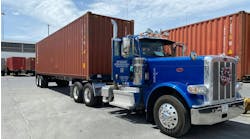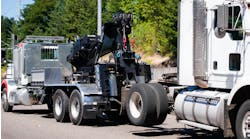A bleary 3 a.m. vote by the House of Representatives’ Transportation and Infrastructure Committee today removed a controversial truck weight increase proposal from the five-year highway funding bill known formally as the American Energy and Infrastructure Jobs Act, allowing the committee to send the bill to the House floor for a vote by a narrow 29 to 24 margin.
The proposal – based on a previous bill entitled the Safe and Efficient Transportation Act (SETA) – would have allowed states to opt into a 97,000-lb. federal Interstate vehicle weight limit for single-trailer trucks equipped with six axles rather than the typical five.
Despite intense lobbying efforts by both those for and against the truck weight proposal, the committee stripped the proposal out and effectively tabled it by requiring the issue to be studied for a further three years.
John Runyan, executive director for the Coalition for Transportation Productivity (CTP) – made up of shippers and trucking companies that supported the weight increase measure – expressed disbelief over the committee’s move, particularly the three-year study requirement.
“We’ve done this all before – in fact, this very committee asked the Transportation Research Board (TRB) to study this same issue back in 1998, and it strongly endorsed truck weight reform in its Special Report 267, issued in 2002,” he told Fleet Owner.
Runyan pointed out that vigorous last-minute opposition by the railroads may have helped tip the scales against the truck weight measure – but that may come back to haunt the industry.
“For the 120 trucking carriers and shippers who spent this week supporting the bill, it was an eye-opening experience – especially for the shippers involved, who were dismayed by the railroad’s moves,” he said.
“This isn’t like the 1990s when it was the trucking industry vs. the railroads; now it’s the trucking industry and shippers vs. the railroads – in effect, their customers,” Runyan added. “And I think a lot of shippers are going to remember that.”
While the measure wasn’t unanimously supported by the trucking industry over a variety of issues – especially in terms of carriers and drivers alike hauling more freight for essentially the same pay – many viewed it as the best way to address highway congestion and air pollution simultaneously.
For example, the American Trucking Assns. (ATA) estimated that the trucking industry will haul 30% more tonnage in 2021 than it does today and thus, if the current 80,000-lb. truck weight limit is kept in place, the trade group figures the U.S. economy will require 18% more trucks on the road driving 27% more miles than they do now.
Groups that opposed any increase in truck weight limits also referenced recent increases in truck-car collision fatality data to buttress their argument for tabling the measure for further study.
“With a 9% increase in truck related fatalities in 2010, traffic safety is a significant concern,” said Jill Ingrassia, AAA’s managing director of government relations & traffic safety advocacy. “Additional research is required to demonstrate exactly how bigger and heavier trucks would impact traffic safety. Absent this research, we cannot take the chance – there is simply too much at stake.”


